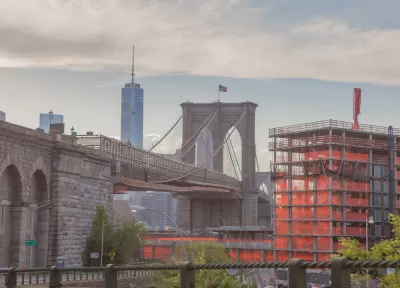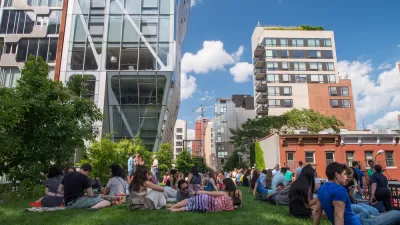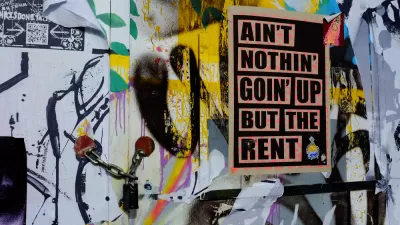Call it the re-education, the evolution, or the contrition of Richard Florida, but the "rock-star urbanist" has realized some unintended consequences of his creative class ethos, and he's ready to share a new vision for cities.

Lydia DePillis reports on the evolution of Richard Florida, who 16 years after his first book, The Rise of the Creative Class, will release a new book called The New Urban Crisis.
According to DePillis, the theories included in The Rise of the Creative Class "proved half true." That is, "[f]or many small, post-industrial cities without assets like big tech companies and universities, no amount of creative-class marketing would turn things around."
Meanwhile, "some cities — San Francisco and New York, Austin and Seattle and Washington — have seen the theory work entirely too well, as creative and techy types revitalized downtown neighborhoods to the point where only bankers and software developers can afford to live in them comfortably."
DePillis attended a recent event in Houston hosted by the Kinder Institute and the Greater Houston Community Foundation, where Florida admitted that his original work did not anticipate the "dark side of the urban creative revolution."
The new book won't be out until next spring, but Florida spoke with DePillis in detail about its genesis (an argument with Joel Kotkin) and some of the realizations that shaped its argument (e.g., the segregation and sorting of growing cities). The new book, explains DePillis, is about "inclusive urbanism": "investing in residents' skills rather than yuppifying their neighborhoods, about retrofitting suburbs for people who might want to be able to walk to a grocery store and piping them into the city with commuter rail."
One pointed moment comes when Florida responds to the politics of the "tribe of urban libertarians," which is probably a code for YIMBYs. Here's Florida in his own words on that subject:
What happened to the urban left is it got captured by critical studies, the people who run around in geography departments and who've just given up reality. These are the people who think you're going to rebuild cities by deregulating land use. Welcome to Houston!
FULL STORY: The re-education of Richard Florida

Study: Maui’s Plan to Convert Vacation Rentals to Long-Term Housing Could Cause Nearly $1 Billion Economic Loss
The plan would reduce visitor accommodation by 25,% resulting in 1,900 jobs lost.

North Texas Transit Leaders Tout Benefits of TOD for Growing Region
At a summit focused on transit-oriented development, policymakers discussed how North Texas’ expanded light rail system can serve as a tool for economic growth.

Alabama: Trump Terminates Settlements for Black Communities Harmed By Raw Sewage
Trump deemed the landmark civil rights agreement “illegal DEI and environmental justice policy.”

How Community Science Connects People, Parks, and Biodiversity
Community science engages people of all backgrounds in documenting local biodiversity, strengthening connections to nature, and contributing to global efforts like the City Nature Challenge to build a more inclusive and resilient future.

Alabama: Trump Terminates Settlements for Black Communities Harmed By Raw Sewage
Trump deemed the landmark civil rights agreement “illegal DEI and environmental justice policy.”

Dear Tesla Driver: “It’s not You, It’s Him.”
Amidst a booming bumper sticker industry, one writer offers solace to those asking, “Does this car make me look fascist?”
Urban Design for Planners 1: Software Tools
This six-course series explores essential urban design concepts using open source software and equips planners with the tools they need to participate fully in the urban design process.
Planning for Universal Design
Learn the tools for implementing Universal Design in planning regulations.
City of Santa Clarita
Ascent Environmental
Institute for Housing and Urban Development Studies (IHS)
City of Grandview
Harvard GSD Executive Education
Toledo-Lucas County Plan Commissions
Salt Lake City
NYU Wagner Graduate School of Public Service




























